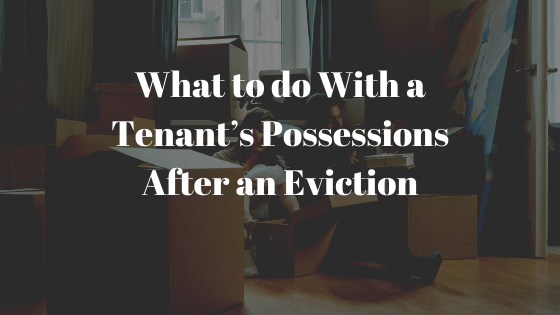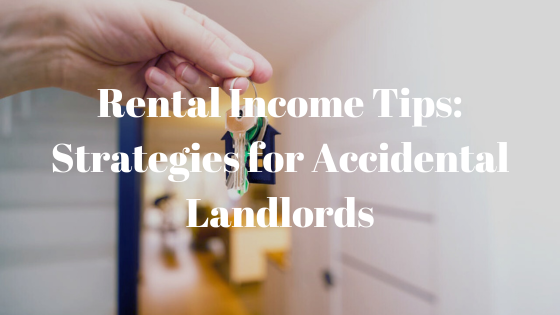What to do With a Tenant’s Possessions After an Eviction

Successfully evicting a difficult tenant is a relief for landlords. However, the eviction process may only be the first step when it comes to cutting links with the tenant. If they left their belongings or personal property behind after the eviction, that can be a complex problem to handle. This is because you can’t simply get rid of the items they left behind. There is a process you must follow, even if those belongings may appear valueless to you.
In this article, we’ll look at the process landlords or rental property owners in North Carolina must follow when a tenant abandons property or possessions left after an eviction.
Determining Whether Property Left Behind is Abandoned
Before you can even think about an
end of tenancy cleaning, you have to access the tenant's abandoned property left behind. This is the first step you should take when tenants leave their possessions on your property or premises after being evicted. To determine whether a tenant has abandoned the property or not, ask yourself the following questions.
- Are they behind on their rent payments? If the rent paid is current, then it means that they haven’t abandoned the rental property.
- Is there a bed, couch, wardrobe, or another piece of significant furniture missing? If so, chances are the tenant has abandoned the rental property.

- Did the tenant leave any valuable items like a television set or lots of clothing? If they did, the property is likely not abandoned.
- Did the tenant leave behind garbage or rotting food? This is common for tenants who are rushing to move out. Generally, people who are gone temporarily will clean out the refrigerator and empty their garbage.
- Did the tenant turn off their utilities? You can determine this by calling the utility company.
- Did the tenant change their address at the post office?
- What are the neighbors saying? Did they see the tenant leaving or hear the tenant saying they were going to leave?
- Do the tenant’s emergency contacts know of their absence or whereabouts?
- Has the tenant responded to any form of communication? If they haven’t responded to your calls, mail or emails, there’s a good chance they’ve abandoned the property.
In addition, as North Carolina landlords, you can consider a rental property abandoned in the following instances.
- The lease agreement has expired.

- You haven’t received any notice of a disability or event that has led to the vacancy.
- The lease agreement hasn’t expired but you have reason to believe the tenant has abandoned the unit. So, you decide to post a notice in conspicuous places inside and outside of the rental unit asking the tenants to respond. If 10 days go by without the tenants responding, you can consider the property to be abandoned after a successful eviction. (N.C. Gen. Stat. § 42-25.9 (2021).)
Disposing of Abandoned Property
The options for disposing of a tenant’s abandoned property for landlords in North Carolina vary depending on the circumstances of the abandonment.
The circumstances are as follows. (N.C. Gen. Stat. § 42-25.9 (2021).)
The property left behind has a maximum value of $750. In this case, you are free to take the abandoned property to a nonprofit that donates or sells, at a nominal price, furnishings or clothing to those in need. The organization must, however, agree to hold the property for at least 30 days in case the tenant decides to claim it. You must then post a notice at the rental unit, as well as the place where rent was received. You must also let the tenant know where their property is being held.
The tenant's property left behind has a maximum value of $500. Here, you can classify the property as abandoned 5 days after the tenant was evicted. After 5 days, you can choose to throw the property away.

The property has a value of $500 - $750. You must keep the abandoned personal property for at least 7 days after a successful eviction. In this case, you can decide to store it offsite.
If the tenant requests their property within 7 days of vacating, you have no option but to return it. If you wish to sell the items, you must serve the tenant with a 7-days notice of sale. This notice period can be instated during the seven days after the eviction process.
You must send notice to the tenant’s
last known address. In this notice, you must ensure you include the date, time and place where the sale is scheduled to happen.
Additionally, you must also state the following:
You’ll apply the sale proceeds to sale costs, storage fees,
damages, and unpaid rent.
The tenant has a right to lay claim on any surplus funds derived from the sale within 7 days of the sale.
You’ll deliver any surplus funds to the government of the county where the property is located 8 days after the sale.
Storage and Disposal
If the tenant left a significant number of items behind, handling it can prove extremely challenging. The following are some actions you can take:
- Throw away any items that are trash.
- Organize the items and take a full inventory.

- Store the items. You can do this either onsite or offsite. However, the latter option is ideal as you may want to re-rent the property.
- Notify the tenant of the personal property left behind. You can also use this opportunity to detail any costs you’ve incurred during this process.
- Dispose of or sell the property after the notice period expires.
- Pay yourself any costs you have incurred in retrieving and storing the property.
Bottom Line
As you can see, even after a tenant is evicted, you can’t get rid of their property as soon as they’re gone. Even once they're off of your property, they retain ownership of their possessions.
If you require assistance during this process,
Dawson Property Management can help! We are a seasoned property management company that takes pride in providing comprehensive leasing and rental home solutions throughout Charlotte and the surrounding areas to landlords and property owners.
Disclaimer:
This blog is only meant to be informational, and should not be substituted for professional legal advice. Also, laws change and this information might no longer be up to date at the time of your reading. For expert help, we recommend you contact a qualified attorney or an experienced property management company in NC.







